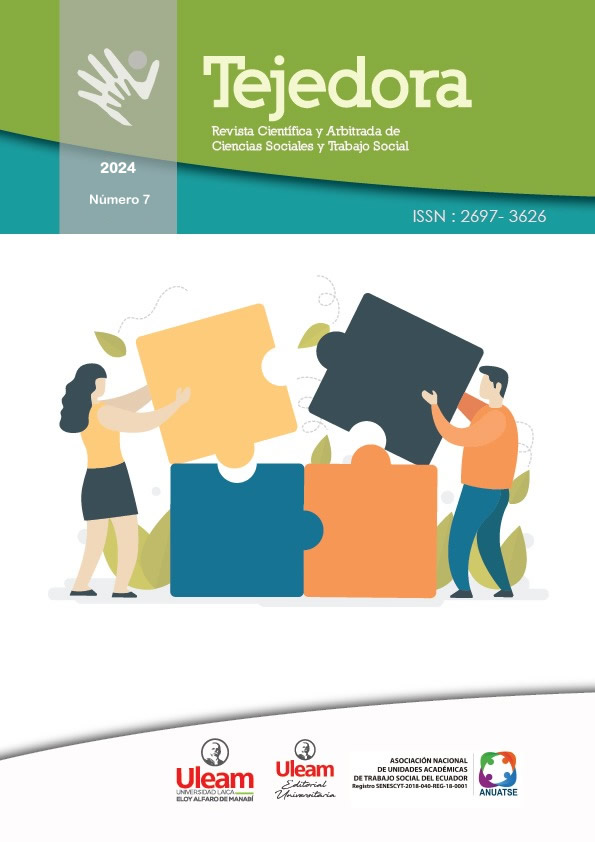FORMAÇÃO DE PROFESSORES SOB O PARADIGMA DA COMPLEXIDADE, UMA NECESSIDADE
DOI:
https://doi.org/10.56124/tj.v7i16.003Palavras-chave:
Formación, disyunción, reducción, abstracción, métodoResumo
O desafio de assumir o pensamento complexo nos processos acadêmicos exige uma abordagem teórico-prática e atitudinal na academia. Este trabalho buscou mostrar que há uma necessidade urgente de apropriação do pensamento complexo na prática diária em sala de aula. A primazia do paradigma da simplificação sobre o da complexidade tem impedido que a formação contribua para a solução de problemas no âmbito local, regional, nacional e internacional. Foi realizada uma busca documental de textos e artigos relacionados ao pensamento complexo, à educação e aos paradigmas que os regem. Foram extraídas ideias-chave que sustentaram a hipótese de que as estruturas de formação e criação de carreira se baseiam em princípios paradigmáticos simplificadores, deixando desafios para continuar a examinar e motivar exercícios de formação com base na complexidade da realidade, chamando a atenção para o fato de que não se trata apenas de falar de complexidade, mas de compreendê-la na vida acadêmica. Se continuarmos no caminho da fragmentação na educação, contribuiremos cada vez mais para o aprofundamento e agravamento dos problemas. O pensamento complexo é uma aventura… Um desafio…
Downloads
Referências
CentrumThink. (2024). CentrumThink. Obtenido de https://acortar.link/h271xQ
Estrada García, A. (2020). Los principios de la complejidad y su aporte al proceso de enseñanza. Avaliação e Políticas Públicas em Educação, vol. 28, núm. 109, 1012-1032. Obtenido de https://www-redalyc-org.ezproxy.esap.edu.co/journal/3995/399565425012/html/
Gonfiantini, V. (2021). Pensar la educación desde la Transdisciplnariedad, Niveles de realidad, Complejidad y Tercero Incluido en un tiempo y un espacio que nos pide “otras ” miradas. CIEG, 142-160. www.grupocieg.org
Lipman, M. (1998). Pensamiento complejo y educación. Ediciones de la Torre.
Luna, M. V. (2014). El paradigma de la complejidad ven discursos sobre formación docente en ciencias. Ciênc. Educ., Bauru, v. 20, n. 4,, 971-986. Obtenido de https://www.scielo.br/j/ciedu/i/2014.v20n4/
Morin, E. (1981). El método 1. La naturaleza de la naturaleza. Cátedra.
Morin, E. (1983). El método 2. La vida de la vida. Cátedra.
Morin, E. (1984). Ciencia con consciencia. Anthropos.
Morin, E. (1988). El método 3. El conocimiento del conocimiento. Cátedra.
Morin, E. (1990). Introducción al pensamiento complejo (Décima reimpresión: enero del 2011 ed.). Gedisa.
Morin, E. (1991). El método 4. Las ideas. Cátedra.
Morin, E. (1998). Articular los saberes ¿Qué saberes enseñar en las escuelas? Universidad del Salvador.
Morin, E. (1999). La cabeza bien puesta. Nueva Visión.
Morin, E. (1999). Los 7 saberes necesarios para la educación del futuro. UNESCO.
Morin, E. (2015). Enseñar a vivir. Manifiesto para cambiar la educación. Nueva Visión.
Morin, E., & Delgado, C. (2017). Reinventar la Educación. Abrir caminos a la metamorfosis de la humanidad. Multiversidad Mundo Real Edgar Morin.
Morin, E., Ciurana, E., & Motta, R. (2003). Educar en la era planetaria. Gedisa.
Nicolescu, B. (1996). La transdisciplinariedad. Manifiesto. Multiversidad Mundo Real Edgar Morin.
Prigogine, I. (1983). ¿Tan sólo una ilusión? Tusquets Editores.
Raiza Andrade y Cadenas, E., Pereira, L. M., Torres, A., & Pachano, E. (2002). El Paradigma de lo Complejo. Cinta de Moebio. Num. 14. Obtenido de https://cintademoebio.uchile.cl/index.php/CDM/issue/view/2365
Salazar, I. C. (2004). El paradigma de la complejidad en la investigación social. Educere, vol. 8, núm. 24, 22-25. Obtenido de https://www.redalyc.org/articulo.oa?id=35602404
Publicado
Como Citar
Edição
Seção
Licença
Copyright (c) 2024 Revista Científica y Arbitrada de Ciencias Sociales y Trabajo Social: Tejedora. ISSN: 2697-3626

Este trabalho está licenciado sob uma licença Creative Commons Attribution-NonCommercial-ShareAlike 4.0 International License.






















